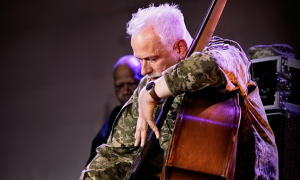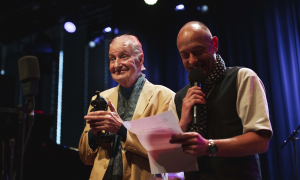Home » Jazz Articles » Profile » Greg Abate: Man on a Journey
Greg Abate: Man on a Journey
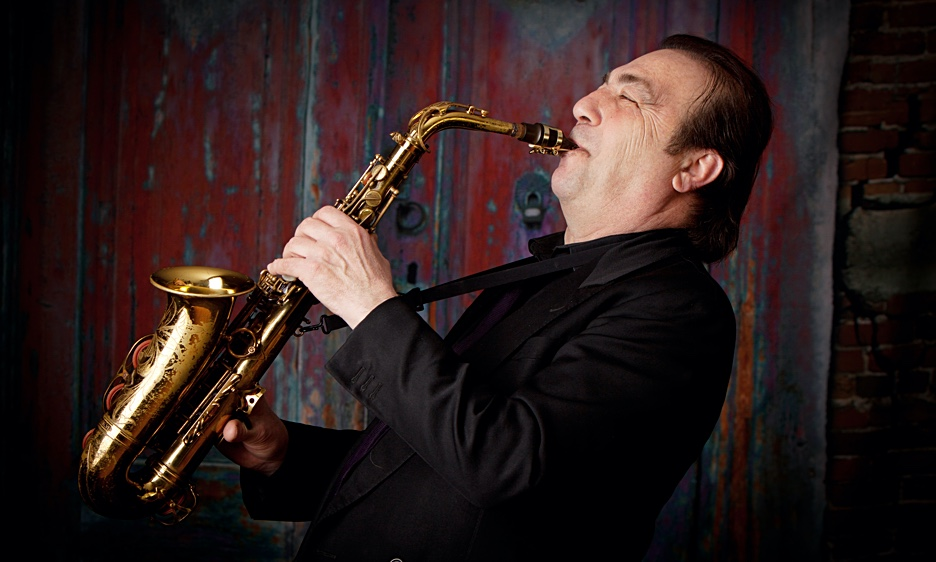
I freaked out listening to Paul Desmond and I wanted to sound like him.
—Greg Abate

Edwin G. Hamilton
drumsb.1991
The Saxophonist and flutist taps out a fast tempo with his foot and the band launches into a scorching version of "Yardbird Suite" with Abate scraping at the edges of its harmonic limits on alto, full of the passion that had been heretofore hidden behind his placid demeanor.
Those are the two faces of

Greg Abate
saxophoneb.1947
Abate lives in Rhode Island, but his real home is on the road.
Abate is part of a dying breed—a journeyman jazz player, who goes from town to town, slowly building up his reputation and spreading the word of jazz to the heartland as well as the many metropolitan cities around the world. It is a tiring and demanding job, but one that Abate is committed to. At the age of 73 he is still going strong and shows no sign of slowing down. In fact, as a hard driving player in the mold of such predecessors as

Cannonball Adderley
saxophone1928 - 1975
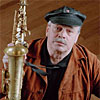
Phil Woods
saxophone, alto1931 - 2015

Sonny Stitt
saxophone1924 - 1982

Jackie McLean
saxophone, alto1932 - 2006
While the idea of a journeyman jazz musician was common from the formative years of the music in the early 1920's and through most of that century, Abate is now a rarity. With the collapse of the recording industry, the rise of canned music, the disappearance of jazz programs on radio and even the demise of music radio altogether, the opportunity of seeing someone in South Carolina who has turned Rhode Island on its head are rare. In fact, if it weren't for Abate's daughter living in Charleston, he may have never been on stage at Fox's at all.
If you have never heard of the itinerant reedman, it is not surprising. For the most part he has battled his way into the jazz realm single handedly. He is not known for being the star soloist in a famous band, although he did travel with

Ray Charles
piano and vocals1930 - 2004

Artie Shaw
clarinet1910 - 2004
Abate was not to a jazz manor born. In fact, his early exposure to music consisted of playing clarinet in the high school band and playing in a rock band. And then came "Take Five" and the

Dave Brubeck
piano1920 - 2012
"I freaked out listening to

Paul Desmond
saxophone, alto1924 - 1977
But even then, his knowledge was limited. "I didn't know about

Charlie Parker
saxophone, alto1920 - 1955

John Coltrane
saxophone1926 - 1967
"Berklee was an authentic jazz school and I learned about real jazz from great teachers like

Charlie Mariano
saxophone, alto1923 - 2009

Herb Pomeroy
trumpet1930 - 2007

Cat Anderson
trumpet1916 - 1981
Phil Wilson
b.1937At Berklee Abate was exposed to music theory, harmony, ear training and even weekly piano lessons. He was surrounded by jazz music and jazz musicians. He had all the information he needed, but little direction in terms of his future. After four years of intensive training he really wasn't a jazz musician and still didn't know what he was going to do next. He had a long way to go.
One of his earliest experiences after Berklee was far removed from jazz. It was a group called The Stingers, a dance band in the early and late '60s in Providence in clubs playing top 40 music.
His next chapter brought him to California in 1970, where he played with with a band called Mass Confusion, which, again, represented a 180 degree turnaround from his experience at Berklee.
"We played mostly top 40 songs and really had a good time," he said.
However, jazz was still on his mind. He was listening to

Cannonball Adderley
saxophone1928 - 1975

John Coltrane
saxophone1926 - 1967
"Improvisation isn't just playing by ear. You have to know the chords and harmony or there is no way you can play a good solo," says Abate. And he wasn't there yet.
He still had a lot of schooling—jazz style—ahead of him. That came from valuable experiences with a variety of big bands, and learning the lessons they had to offer.
Abate joined Ray Charles' band in 1973 and stayed for a year, and it allowed him to earn a steady living while learning some of the challenges of leading a band from one of the masters of modern pop music.
In Charles' band Abate sought and found approval from veteran musicians who had been on the road for decades. "I learned a lot about timing, intonation, tone, self expression and patience on that band," Abate recalled.
After returning to Providence, Abate formed his own fusion band called Channel 1, which allowed him to foster his development as a writer and learn more about harmony and melody. That, in turn made him a more effective soloist.
At the same time, he was a vital part of the " data-original-title="" title="">Duke Belaire big band from 1978 to 1984, which had reached near legendary stature in New England, and allowed him to play side by side with another group of top notch musicians.
His final extended involvement with a big band came from the reconstituted Artie Shaw band. "It gave me the opportunity once again to tour the country and to become more disciplined."
"I evolved in my mind while with the Shaw band," explained Abate. "I had more complexity in my head. It felt challenging. I got really involved with playing the melodic stuff. Artie Shaw was a big fan of Parker and I started listening more to Dizzy and Bird and

Bud Powell
piano1924 - 1966
"I played in the Artie Shaw band for two years. Most of my solos were 8 bars, which was a little frustrating. I didn't want to be just a reader and a utility person. However, I was gaining harmonic knowledge and learning to play with good time and accuracy.
"The Belaire band was more of a free blowing band. Artie Shaw's band was more demanding and required more accuracy. I had to deal with not having enough technique and not knowing the changes that well. I started to realize that I couldn't slip by without really getting into it. It was very hard to hear the real deal of chord changes. The Artie Shaw band forced me to understand harmony more."
In 1987, after leaving the Shaw band, Abate travelled to Quebec City in Canada with his wife for their honeymoon. Finally, at the age of 40, Abate was about to serendipitously make his mark on the jazz world.
"My wife suggested that I bring my alto" recounted Abate. "I ended up sitting in at a club called The Clarendon. I made contacts with all the guys in the band, which lead to me being invited to play at the Rimouski Festival."
Contacts there brought him to the 2080 club in Montreal, which in turn connected him to Mark Morganelli and Alan Bates, at the Black Lion and Candid jazz labels and his illustrious recording career was born, with the release of The Greg Abate Quartet Live at Birdland. Being on a respected jazz label meant everything to an ambitious jazz musician. His albums were being played all over the country on college jazz stations and commercial jazz programs alike. Positive reviews popped up in magazines like Down Beat and Jazz Times.
"I was on my way in my mind," recalled Abate. "I would look up clubs all over the country and send cds with a hand written letter to night clubs, agents and festivals. The more recordings the more gigs I got. People with connections would give me a card at a night club. Because I was never able to interest an agent or manager, I did it on my own. I hired better known musicians to work with, like Phil Woods,

Richie Cole
saxophone, alto1948 - 2020

Lew Tabackin
saxophone, tenorb.1940

Nick Brignola
saxophone, baritone1936 - 2002
One of Abate's most important collaboration was with Woods on the Rhombus label and later with Whaling City.
"In 2012 I called him up at home to see if he would record with me," said Abate. "He was a little familiar with me through my recordings, but was too busy. I kept calling him back and he finally agreed to record Greg Abate featuring Phil Woods."
When the album came out, Woods was quoted as saying 'I sleep better at night knowing there are players like Greg Abate out there." That served as an inspiration to him to keep plugging away.
Abate followed that up with a live recording with Woods in 2014.
Abate feels that his association with Woods and many other veterans helped him evolve as a player. His technique improved, he learned more tunes and began to tell a story while using more space and less notes. "I found myself becoming less anxious, embracing every note and being more selective in my lines. "I'm still reaching out and getting better known. Whaling City (Abate's current label affiliation) has more distribution and air play than Candid did. I don't think I will ever reach my pinnacle, but will always be reaching out. Playing music and practicing is an ongoing process and I just have to enjoy the journey. I feel really fortunate to make a decent living playing jazz. I haven't became a big household name, but I'm in the thick of it."
The 21st century jazz scene is rarely a generous one. With the exception of the truly elite players, most musicians are forced by economics to travel as "singles," picking up a different rhythm section in each town they play and that composes a large portion of Abate's gigs. While it has its benefits, it is strewn with pitfalls as well.
"A lot of promoters don't know that someone that plays dixieland can't play bebop," Abate explains. "Every night is a different rhythm section—as often as 21 days in a row. You do a sound check, feel the strength of the band and determine the level of tunes to play. A lot of times you start a tune fast and it slows down or begins slow and speeds up. You have to try to make your sidemen comfortable. After all, they are people before they are musicians. Sometimes a drummer will be too busy, the bassist's time might be shaky. Some pianists are too busy on comping or not sustaining the chords enough."
While a lot of people his age are basking in the pleasures of retirement, Abate is gearing up for an even more ambitious career and is by no means ready to hang it up. He would like to have the support of an agent or manager, but in the meantime he is constantly on the phone, following up on leads for gigs. He also has some thoughts in the back of his mind about future recordings.
"I want to do another quintet album with a trumpet player with a burning rhythm section performing new originals. Also, would like to have a guitar in the front line with me like Phil Woods with Harry Leahey" says Abate. "I am hoping to play more in New York at some of the more prestigious clubs like Dizzy's and The Village Vanguard."
"I'm recording album with

Kenny Barron
pianob.1943
Tags
Profile
Greg Abate
Rob Rosenblum
United States
Frank Puzzullo
Sam Edwards
Edwin Hamilton
Cannonball Adderley
Phil Woods
Sonny Stitt
Jackie McLean
Ray Charles
Artie Shaw
Dave Brubeck
Charlie Parker
John Coltrane
Charlie Mariano
Herb Pomeroy
Cat Anderson
Phil Wilson
Duke Belair
Bud Powell
Richie Cole
lew tabackin
Nick Brignola
Harry Leahey
Kenny Barron
Comments
PREVIOUS / NEXT
Support All About Jazz
 All About Jazz has been a pillar of jazz since 1995, championing it as an art form and, more importantly, supporting the musicians who make it. Our enduring commitment has made "AAJ" one of the most culturally important websites of its kind, read by hundreds of thousands of fans, musicians and industry figures every month.
All About Jazz has been a pillar of jazz since 1995, championing it as an art form and, more importantly, supporting the musicians who make it. Our enduring commitment has made "AAJ" one of the most culturally important websites of its kind, read by hundreds of thousands of fans, musicians and industry figures every month.



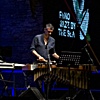



 Buy Now
Buy Now




